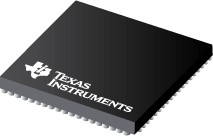Datasheet Texas Instruments TMS320DM335ZCEA216 — Datenblatt
| Hersteller | Texas Instruments |
| Serie | TMS320DM335 |
| Artikelnummer | TMS320DM335ZCEA216 |

System-on-Chip (DMSoC) für digitale Medien 337-NFBGA -40 bis 100
Datenblätter
TMS320DM335 Digital Media System-on-Chip (DMSoC) datasheet
PDF, 1.2 Mb, Revision: C, Datei veröffentlicht: Jun 24, 2010
Auszug aus dem Dokument
Preise
Status
| Lifecycle Status | Obsolete (Manufacturer has discontinued the production of the device) |
| Manufacture's Sample Availability | No |
Verpackung
| Pin | 337 | 337 | 337 | 337 |
| Package Type | ZCE | ZCE | ZCE | ZCE |
| Industry STD Term | NFBGA | NFBGA | NFBGA | NFBGA |
| JEDEC Code | S-PBGA-N | S-PBGA-N | S-PBGA-N | S-PBGA-N |
| Device Marking | A216 | DM335ZCE A216 | DM335ZCE | TMS320 |
| Width (mm) | 13 | 13 | 13 | 13 |
| Length (mm) | 13 | 13 | 13 | 13 |
| Thickness (mm) | .89 | .89 | .89 | .89 |
| Pitch (mm) | .65 | .65 | .65 | .65 |
| Max Height (mm) | 1.3 | 1.3 | 1.3 | 1.3 |
| Mechanical Data | Herunterladen | Herunterladen | Herunterladen | Herunterladen |
Öko-Plan
| RoHS | Not Compliant |
| Pb Free | No |
Design Kits und Evaluierungsmodule
- Development Kits: TMDSEVM355
TMS320DM355 Digital Video Evaluation Module
Lifecycle Status: NRND (Not recommended for new designs) - JTAG Emulators/ Analyzers: TMDSEMU200-U
XDS200 USB Debug Probe
Lifecycle Status: Active (Recommended for new designs) - JTAG Emulators/ Analyzers: TMDSEMU560V2STM-UE
XDS560v2 System Trace USB & Ethernet Debug Probe
Lifecycle Status: Active (Recommended for new designs) - JTAG Emulators/ Analyzers: TMDSEMU560V2STM-U
XDS560v2 System Trace USB Debug Probe
Lifecycle Status: Active (Recommended for new designs)
Anwendungshinweise
- Implementing DDR2/mDDR PCB Layout on the TMS320DM335 DMSoC (Rev. D)PDF, 127 Kb, Revision: D, Datei veröffentlicht: Nov 11, 2009
This application report contains implementation instructions for the DDR2/mDDR interface contained on the TMS320DM335 Digital Media System-on-Chip (DMSoC) device. The approach to specifying interface timing for the DDR2/mDDR interface is quite different than on previous devices.The previous approach specified device timing in terms of data sheet specifications and simulation models. The syste - TMS320DM355/335 Migration Guide (Silicon revision 1.1, 1.3 and 1.4) (Rev. B)PDF, 75 Kb, Revision: B, Datei veröffentlicht: Jan 5, 2011
This application report describes the differences between Silicon revision 1.1, 1.3 and 1.4 of the TMS320DM355/DM335 digital media system-on-chip (DMSoC). This document discusses behavior different from that described in the TMS320DM355 Digital Media System-on-Chip (DMSoC) ARM Subsystem User's Guide (SPRUFB3) and the TMS320DM335 Digital Med - Powering the TMS320DM335 and TMS320DM355 with the TPS650061PDF, 144 Kb, Datei veröffentlicht: Oct 13, 2011
TPS650061, TMS320DM335, TMS320DM355 Powering the DM335 and DM355 with the TPS650061 - TMS320DM355 DSP Power Reference Design PR742 (Rev. A)PDF, 199 Kb, Revision: A, Datei veröffentlicht: Aug 8, 2008
This reference design is for the TMS320DM335/DM355 digital signal processor (DSP) and accounts for voltage, current, and sequencing requirements. The operating input voltage ranges from 2 V to 5.5 V for Li-ion batteries and 3 AA batteries. This design also can work with 2 AA batteries with some limitations. The design is optimized for efficiency over the full range of operation and low overall cos - Building a Small Embedded Linux Kernel Example (Rev. A)PDF, 1.3 Mb, Revision: A, Datei veröffentlicht: May 27, 2008
Building a Small Embedded Linux Kernel Example Application Report - EDMA v2.0 to EDMA v3.0 (EDMA3) Migration Guide (Rev. A)PDF, 292 Kb, Revision: A, Datei veröffentlicht: Aug 21, 2008
This application report summarizes the key differences between the enhanced direct memory access (EDMA3) used on C64x+в„ў DSP devices and the EDMA2 used on TMS320C64xв„ў DSP devices, and provides guidance for migrating from EDMA2 to EDMA3. - Understanding TI's PCB Routing Rule-Based DDR Timing Specification (Rev. A)PDF, 93 Kb, Revision: A, Datei veröffentlicht: Jul 17, 2008
This application report motivates the way the DDR high-speed timing requirements are now going to be communicated to system designers. The traditional method of using data sheet parameters and simulation models is tedious. The system designer uses this information to evaluate whether timing specifications are met and can be expected to operate reliably.Ultimately, the real question the hardwa - High-Speed Interface Layout Guidelines (Rev. G)PDF, 814 Kb, Revision: G, Datei veröffentlicht: Jul 27, 2017
As modern bus interface frequencies scale higher, care must be taken in the printed circuit board (PCB) layout phase of a design to ensure a robust solution.
Modellreihe
Serie: TMS320DM335 (6)
- TMS320DM335CZCE216 TMS320DM335DZCE135 TMS320DM335DZCE216 TMS320DM335ZCE270 TMS320DM335ZCEA135 TMS320DM335ZCEA216
Herstellerklassifikation
- Semiconductors > Processors > Digital Signal Processors > Media Processors > DaVinci Video Processors